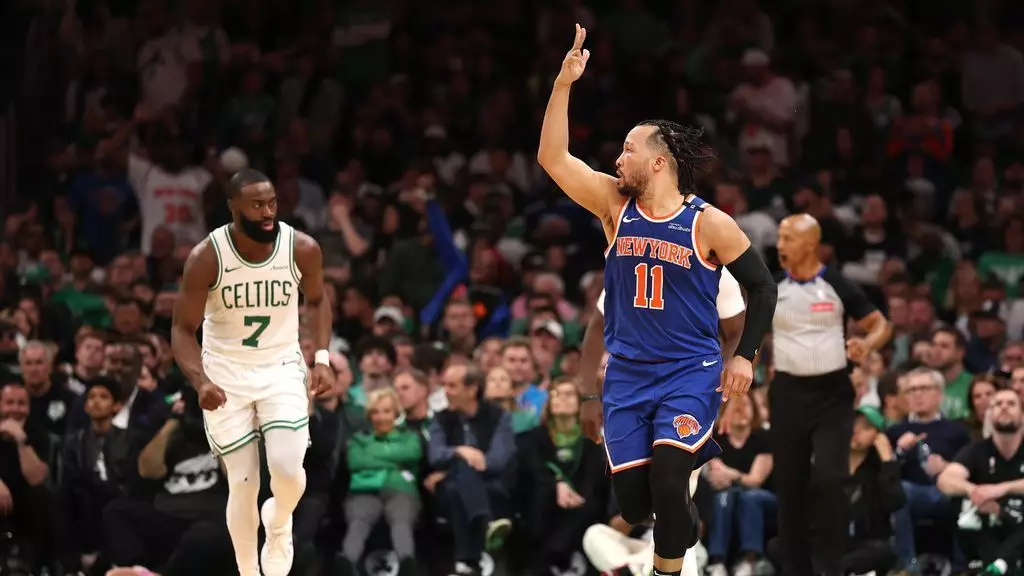The atmosphere in TD Garden was electric, but for the New York Knicks, the early moments of Game 1 in the Eastern Conference semifinals against the defending champion Boston Celtics felt overwhelmingly bleak. Star center Karl-Anthony Towns found himself in considerable foul trouble, which significantly weakened his team’s defense. The Knicks were getting pounded on the boards—especially on the offensive glass, where the Celtics seemed to feast at will. To exacerbate matters, Knicks players were struggling with their shooting, including an almost comical performance at the free-throw line, where their success rate hovered barely below 50%. As the third period wore on, the team’s collective frustration grew palpable, especially after an Al Horford transition dunk extended Boston’s lead to 20 points.
Yet, against this backdrop, a peculiar resilience began to emerge within the Knicks’ ranks, ignited during a strategically-timed timeout. “We told each other to just keep believing; keep firing,” Jalen Brunson recounted. This assertion of resolve signified not just an attitude but a profound mental shift that would change the trajectory of the game and potentially the series.
The Comeback That Defied Logic
Staring down the barrel of a crushing defeat, the Knicks exemplified a remarkable tenacity that ultimately led to one of the most unforeseen comebacks witnessed in recent playoff history. Possession by possession, they started to chip away at the daunting deficit instead of succumbing to panic. This shift from despair to determination is a testament to the character this team has shown over the past season. By the end of the third quarter, the Knicks had reduced the 20-point gap to a more manageable nine.
OG Anunoby emerged as a beacon of hope for the Knicks, delivering the highest-scoring game of his playoff career with 29 points, including six vital three-pointers. His high-flying dunk tied the score at 86 late in the fourth quarter, marking a pivotal moment in a frenetic matchup. Assisted by equally formidable play from Brunson, who tallied another 29 points, the Knicks not only regained composure but also the lead—an achievement that seemed inconceivable following the disastrous first half.
The Celtics’ Puzzling Strategy
While the Knicks found their rhythm, the Celtics’ approach—or notable lack thereof—begged criticism. It was bewildering to witness the defending champions launch an NBA playoff-record 60 three-pointers, and yet, miss a staggering 45 of those attempts. Jayson Tatum was particularly guilty, with a frustrating 4-of-15 performance from beyond the arc. At times, it felt as if the Celtics had forgotten the fundamentals; with New York struggling defensively due to foul troubles, settling for outside shots instead of exploiting the paint showed a lack of adaptation to the game scenario.
These strategic oversights became even more evident as the Knicks pushed back. With Towns in foul trouble and Miles Bridges striding to the forefront, the Knicks capitalized, turning what was once a desperate situation into an opportunity. Even as the clock wound down and both teams were trading blows, Boston’s reliance on three-point shooting clashed against the Knicks’ newfound offensive urgency. This became a crucial narrative thread, illuminating the Celtics’ inconsistency and the Knicks’ unwavering resolve.
The Overtime Climax
As the clock struck zero at the end of regulation, the atmosphere was charged with uncontainable tension. Both teams had fought tooth and nail to get there, but the Knicks, armed with their indomitable spirit, surged into overtime. Key plays from Towns, Bridges, and Anunoby saw the team pull ahead, while on Boston’s side, Derrick White attempted to steady the ship, contributing pivotal points as well.
Yet it was Bridges who undoubtedly cemented his place in this game’s lore. His defensive acumen manifested in a game-changing steal from Jaylen Brown during the final moments of overtime, effectively sealing the Knicks’ 108-105 victory. What started as an arduous uphill struggle transformed into a statement win, signaling to the league that this year’s Knicks are far from pushovers, even against their historically dominant rivals.
In a season where the Knicks stumbled against the top teams in the East, this win offers a glimmer of hope—and ultimately begs the question: could this team, riddled with past failures, emerge into a formidable contender? The heart they displayed in Boston would suggest the answer could very well be ‘yes.’

